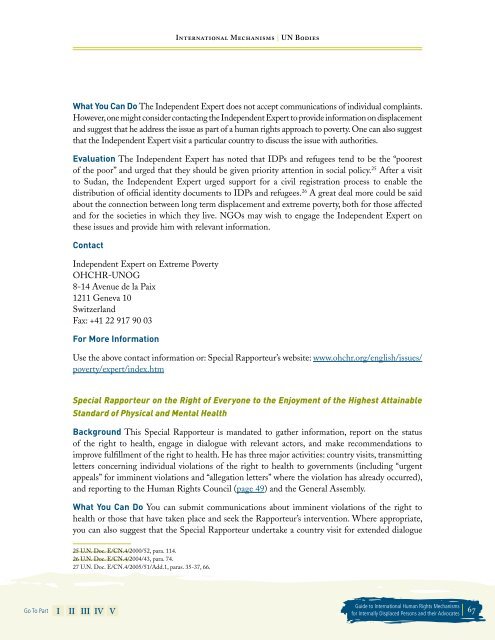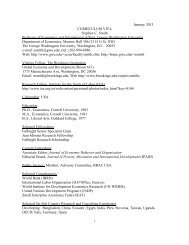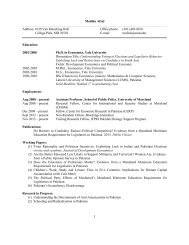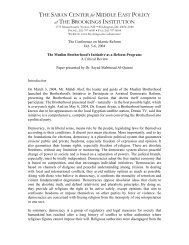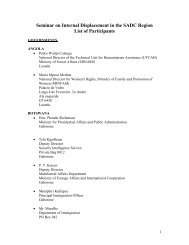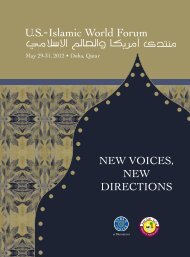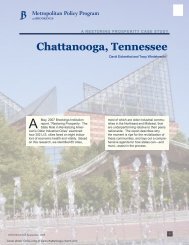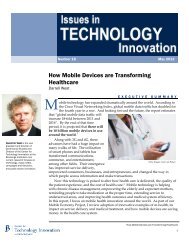Guide to International Human Rights Mechanisms - Brookings
Guide to International Human Rights Mechanisms - Brookings
Guide to International Human Rights Mechanisms - Brookings
You also want an ePaper? Increase the reach of your titles
YUMPU automatically turns print PDFs into web optimized ePapers that Google loves.
Go To Part I II III IV V<br />
<strong>International</strong> <strong>Mechanisms</strong> | UN Bodies<br />
What you can Do The Independent Expert does not accept communications of individual complaints.<br />
However, one might consider contacting the Independent Expert <strong>to</strong> provide information on displacement<br />
and suggest that he address the issue as part of a human rights approach <strong>to</strong> poverty. One can also suggest<br />
that the Independent Expert visit a particular country <strong>to</strong> discuss the issue with authorities.<br />
evaluation The Independent Expert has noted that IDPs and refugees tend <strong>to</strong> be the “poorest<br />
of the poor” and urged that they should be given priority attention in social policy. 25 After a visit<br />
<strong>to</strong> Sudan, the Independent Expert urged support for a civil registration process <strong>to</strong> enable the<br />
distribution of official identity documents <strong>to</strong> IDPs and refugees. 26 A great deal more could be said<br />
about the connection between long term displacement and extreme poverty, both for those affected<br />
and for the societies in which they live. NGOs may wish <strong>to</strong> engage the Independent Expert on<br />
these issues and provide him with relevant information.<br />
contact<br />
Independent Expert on Extreme Poverty<br />
OHCHR-UNOG<br />
8-14 Avenue de la Paix<br />
1211 Geneva 10<br />
Switzerland<br />
Fax: +41 22 917 90 03<br />
for more information<br />
Use the above contact information or: Special Rapporteur’s website: www.ohchr.org/english/issues/<br />
poverty/expert/index.htm<br />
Special Rapporteur on the Right of Everyone <strong>to</strong> the Enjoyment of the Highest Attainable<br />
Standard of Physical and Mental Health<br />
Background This Special Rapporteur is mandated <strong>to</strong> gather information, report on the status<br />
of the right <strong>to</strong> health, engage in dialogue with relevant ac<strong>to</strong>rs, and make recommendations <strong>to</strong><br />
improve fulfillment of the right <strong>to</strong> health. He has three major activities: country visits, transmitting<br />
letters concerning individual violations of the right <strong>to</strong> health <strong>to</strong> governments (including “urgent<br />
appeals” for imminent violations and “allegation letters” where the violation has already occurred),<br />
and reporting <strong>to</strong> the <strong>Human</strong> <strong>Rights</strong> Council (page 49) and the General Assembly.<br />
What you can Do You can submit communications about imminent violations of the right <strong>to</strong><br />
health or those that have taken place and seek the Rapporteur’s intervention. Where appropriate,<br />
you can also suggest that the Special Rapporteur undertake a country visit for extended dialogue<br />
25 U.N. Doc. E/CN.4/2000/52, para. 114.<br />
26 U.N. Doc. E/CN.4/2004/43, para. 74.<br />
27 U.N. Doc. E/CN.4/2005/51/Add.1, paras. 35-37, 66.<br />
<strong>Guide</strong> <strong>to</strong> <strong>International</strong> <strong>Human</strong> <strong>Rights</strong> <strong>Mechanisms</strong><br />
for Internally Displaced Persons and their Advocates


